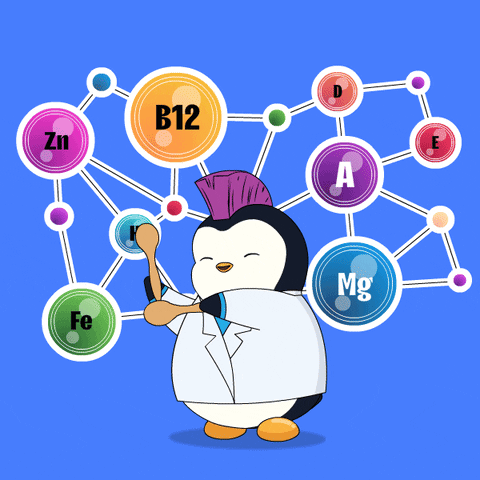- Longevity Rehab Center
- Posts
- Common Vitamins YOU May Be Missing and the Signs to Watch For
Common Vitamins YOU May Be Missing and the Signs to Watch For
As we age, our bodies change in ways that can affect how we absorb and process nutrients, especially vitamins that are critical for maintaining overall health. It’s common for seniors to become deficient in certain vitamins, which can lead to various health concerns. In this post, we’ll explore some of the key vitamins seniors may be missing and the signs that could indicate a deficiency.

Gif by FiaOruene on Giphy
1. Vitamin D
Why It’s Important:
Vitamin D helps the body absorb calcium, which is essential for bone health. It also plays a role in immune function and reducing inflammation.
Signs You May Be Missing It:
• Fatigue and muscle weakness
• Bone pain or frequent fractures
• Frequent infections (weakened immune system)
• Mood changes, including symptoms of depression
As we age, the skin becomes less efficient at producing vitamin D from sunlight, and many older adults spend less time outdoors. This makes vitamin D deficiency quite common among seniors.
How to Get More:
• Sunlight (20 minutes of exposure can help)
• Foods like fortified dairy products, eggs, and fatty fish (like salmon or mackerel)
• Vitamin D supplements

Gif by pudgypenguins on Giphy
2. Vitamin B12
Why It’s Important:
Vitamin B12 is crucial for brain function, nerve health, and the production of red blood cells. However, as we age, stomach acid production decreases, making it harder to absorb B12 from food.
Signs You May Be Missing It:
• Fatigue and weakness
• Memory problems or confusion
• Numbness or tingling in the hands and feet
• Balance issues or difficulty walking
Seniors who are deficient in vitamin B12 may not notice symptoms right away, but over time, it can lead to more serious issues like anemia or neurological problems.
How to Get More:
• Animal products like meat, fish, eggs, and dairy
• Fortified cereals and plant-based milks
• B12 supplements or injections (if prescribed by a doctor)
3. Calcium
Why It’s Important:
Calcium is vital for strong bones and teeth. As bone density decreases with age, calcium becomes even more crucial to prevent fractures and osteoporosis.
Signs You May Be Missing It:
• Muscle cramps or spasms
• Weak or brittle nails
• Tingling in the fingers
• Frequent bone fractures
Post-menopausal women, in particular, are at a higher risk of calcium deficiency due to hormonal changes.
How to Get More:
• Dairy products (milk, cheese, yogurt)
• Leafy green vegetables (like spinach and kale)
• Calcium-fortified foods (like certain cereals and plant-based milks)
• Calcium supplements
4. Vitamin C
Why It’s Important:
Vitamin C is an antioxidant that supports immune health, helps the body repair tissues, and aids in the absorption of iron.
Signs You May Be Missing It:
• Slow wound healing
• Bruising easily
• Dry, rough skin
• Frequent colds or infections
Because vitamin C is not stored in the body, it needs to be consumed regularly. Seniors with limited diets may not get enough from food sources alone.
How to Get More:
• Citrus fruits (oranges, grapefruits)
• Bell peppers, strawberries, and broccoli
• Vitamin C supplements
5. Vitamin A
Why It’s Important:
Vitamin A is important for vision, immune function, and skin health. As we age, a deficiency in this vitamin can exacerbate age-related vision issues.
Signs You May Be Missing It:
• Night blindness or difficulty seeing in low light
• Dry eyes or skin
• Increased risk of infections
How to Get More:
• Foods like sweet potatoes, carrots, and dark leafy greens
• Liver (in moderation)
• Vitamin A supplements (but avoid over-supplementing as high doses can be toxic)
6. Vitamin E
Why It’s Important:
Vitamin E is another powerful antioxidant that helps protect cells from damage. It also supports immune health and may reduce the risk of heart disease.
Signs You May Be Missing It:
• Muscle weakness
• Vision problems
• Poor coordination or difficulty walking
Although vitamin E deficiency is less common, it’s more likely to occur in seniors with conditions that affect fat absorption.
How to Get More:
• Nuts and seeds (like almonds, sunflower seeds)
• Spinach and broccoli
• Vitamin E supplements
Conclusion:
As we age, it’s important to be mindful of nutrient intake, as the body may struggle to absorb vitamins that are critical for overall health. If you or a loved one are experiencing any of the signs mentioned above, consider adjusting your diet or discussing supplementation with a healthcare provider.
Ensuring a balanced, nutrient-rich diet and regular check-ups can go a long way in maintaining health and vitality in the golden years!
This blog post covers the essentials, but feel free to reach out if you’d like to add any personalized tips or services related to senior nutrition.

Reply